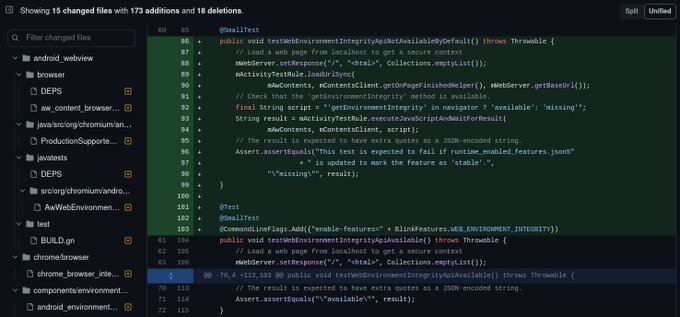A recent Google proposal of an unexpected web standard – DRM – has raised the eyebrows of the user community.
Termed the “Google Web Environment Integrity API,” this proposal has sparked heated debates within the online community.
Authored by four Google team members, including a member from Chrome’s “Privacy Sandbox,” the API aims to address the challenges posed by the demise of tracking cookies by integrating a user-tracking ad platform directly into the user browser.
The fundamental idea behind the Google Web Environment Integrity API revolves around the trust relationship between websites and their client environments.

Users often rely on websites to trust the honesty and security of their client environment, expecting their data and intellectual property to be safeguarded.
Additionally, transparency regarding human interaction is crucial. The API is intended to serve these purposes and establish a more secure web environment. However, the implications of this proposal are not without controversy.
Google Web Environment Integrity API: Understanding the Trust Factor

The Internet community has voiced their opinions regarding the Google Web Environment Integrity API, expressing both praise and criticism.
Some users have found the API’s privacy claims to be questionable, leading them to explore alternative browsers like Vivaldi.
However, they were disappointed to encounter unexpected behaviors during installation, eroding trust in the claimed privacy features. This has raised concerns about the true intentions of Google’s proposed standard.
Other users have pointed out potential legal issues, particularly concerning EU regulations. The proposed API may conflict with EU laws, leading to debates over tax obligations in different countries.
Google’s ad revenue and international operations could be affected if deemed non-compliant, prompting countries to take swift actions to protect their interests.
Amidst the growing concerns, voices in the tech community, including some users on the Y Combinator forum, are calling for strong actions against implementing the Google Web Environment Integrity API.
Some argue that if Google has the power to alter the basic principles of the web unilaterally, the relevance of W3C (World Wide Web Consortium) becomes questionable.
The community urges Mozilla to take a firm stance, considering the organization’s historic role as a defender of web ideals. Opposing the proposal alone may not be enough; decisive action is needed to protect the integrity of the web and prevent Google’s potential dominance.
Unpacking the “dangerous” Google Web Environment Integrity specification
To better understand the Google Web Environment Integrity API, let’s examine the arguments of Shrouded Elysium, a prominent voice in the tech community.
Shrouded Elysium points out that while the API’s goals may seem reasonable, its proposed implementation poses significant dangers to the open web.
The Google Web Environment Integrity API intends to provide websites with an API confirming whether an authoritative third party, an attester, trusts the browser and platform. However, this opens up possibilities for excluding new browsers and legacy software, potentially leading to a more closed web environment.
“The trust relationship between websites and clients is frequently established through the collection and interpretation of highly re-identifiable information. However, the signals that are considered essential for these safety use cases can also serve as a near-unique fingerprint that can be used to track users across sites without their knowledge or control”, says Shrouded Elysium.
The primary concern is that companies like Google may have the power to decide which browsers are trustworthy on their respective platforms.
This may lead to favoritism toward their own browsers while disadvantaging competitors. The lack of clarity regarding how the API will verify genuine user interactions raises further doubts about its effectiveness and potential for abuse.
Hope for Regulation: Addressing the Legal and Ethical Challenges
Despite the apprehension, there is hope that legal frameworks, particularly those in the European Union, will prevent the concentration of power in the hands of a few companies regarding browser trustworthiness.
Regulations and oversight may be necessary to ensure a fair and open web environment. However, the process of implementing such measures can be slow, leaving room for potential damage while stakeholders seek resolutions.
The Google Web Environment Integrity API is just one example of Google’s growing influence and dominance in the web browser market.
It raises concerns about the potential for Google to become an existential threat to the open web, and the freedom to surf internet.
The debate surrounding the Google Web Environment Integrity API is far from over.
While the proposed API aims to enhance trust and security on the web, it has also raised valid concerns about the concentration of power, privacy, and the future of an open web.